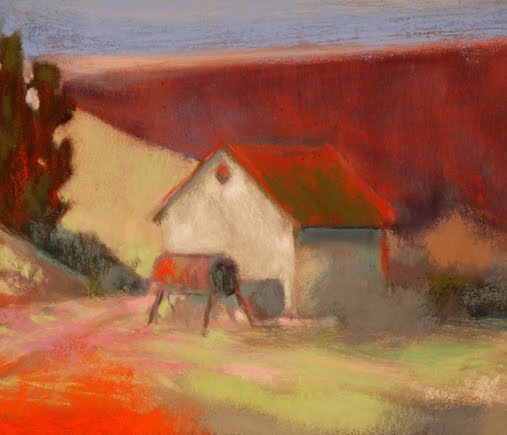Casey Klahn
Yes, It's Cold Outside
Photo: Lorie Klahn
Thursday, December 30, 2010
Friday, December 24, 2010
Pastel Christ by Odilon Redon, via SPN
Christ in Silence
58cm x 46cm
Pastel & Charcoal
Odilon Redon
Mario Vucelic, who blogs at Soft Pastel News, offered this post featuring Odilon Redon's Christ in Silence.
Of course, the crow means death, which was always the purpose of our Lord's incarnation - to die and rise again. Christ is contemplative, holding the crow in front of Him.
Odilon Redon (April 20, 1840 – July 6, 1916)
Wednesday, December 22, 2010
How To Find The Subjects
Cindy Michaud asked me to follow up on the previous post about what to leave in, and what to leave out. In that post, I wrote about finding your subjects, and gave my examples of the river and the prairie. But, how to find them is the core question.
Would it be obtuse of me to say that your subjects may find you? Here's what I mean. Decide what your best recent works are. Perhaps you have 6 or 10 of them framed that you really feel represent your best work. What are the subjects? You find when painting these given things, such as botanicals or wildlife or city streets, that you do your best work. These are the subjects that sing for you.
Concentrate on these few things that you've identified. Spend your next several studio sessions just painting these things. Right now, for me, it is a river in the forest. Specifically, the Little Hoquiam River, on the coast in Washington state.
Studio Hoquiam River Scenes
Monday, December 20, 2010
What To Leave In, What To Leave Out.
![[Waning+Light+72.jpg]](https://blogger.googleusercontent.com/img/b/R29vZ2xl/AVvXsEgVl4J7O1pGniVOJC5fTCz3xTfb_2pIRMiC0aWyKd4q8pNlwRWcmzVCHuU9V1qgbHxWeDRKe_X7mIgCPWQRlgE3T8ErbltnBN8eF_Z7PNp9n7k0FOQzNyIrK590De2tCsjwR5-LbjGfKyk/s1600/Waning+Light+72.jpg)
![[somtimesweather+72.jpg]](https://blogger.googleusercontent.com/img/b/R29vZ2xl/AVvXsEgf4PkMbGl9wEX5vuLnQqDbMGG0EBChEbOqjfL-oyKfAf45jTirUZOnds6TUOi4CnmqYuOcx51DS9gLMAPF-yjeu4VhtLVBZmN0l0qlV068wH_aAWDfacZbV1DEJFnRDamGVIKSh4qZuLQ/s1600/somtimesweather+72.jpg)

It was interesting to see a great pastel artist list his focus on a narrow range of subjects in a book I read recently. The book is a dated one by Albert Handell: Pastel Painting Workshop. He likes the Southwestern landscape with arroyos and pueblo-style structures. He does trees, rock boulders and waterways. In his figurative work, he likes vignettes and portraits.
Why be narrow in subject matter?
It is good to be aware of what your subject matter is before you go off to the field to paint on site. Why be narrow in subject matter? My own feelings are that you may delve into a subject as deeply as you wish, and may never run out of inspiration. If your goal is to "draw things", then you may wish to pursue every possible subject one after the other. But, if you are wanting to produce paintings with depth and with good technique, then limiting yourself to a handful of subjects will provide you a greater opportunity for depth.
Limiting your subject matter will put you in good company.
Limiting your subject matter will put you in good company. Van Gogh stayed with agricultural landscapes in France that revolved around trees, waterways, fields, buildings and bridges. He did portraits and still lifes, but he stayed with common themes. Degas stayed with interior and theatrical figures, such as orchestras, singers and ballerinas. He did nudes at the bath. He also liked the horse track, and some industrial interiors. Daniel Greene stays with the portrait, but in his figurative work he focuses on painting his wife, artist Wende Caporale, in the New York subway with tile mosaic backgrounds. Of course, he does other works, but his series work is a method of staying focused. Harvey Dinnerstein does self portraits where he is painting bare chested, and Andrew Wyeth stayed on the Helga series for a number of years. His Helga series kept true to his own ouevre of rural interiors and moods.
Limiting my subject matter helps tremendously in finding compositions.
My own oeuvre features trees, forests, rivers and the prairie. Sometimes rural buildings are featured, and rarely do I bring in the sky, horizons or light. It's interesting to think of what I purposefully omit. The horizon is too much landscape - too boilerplate. Light is not much of a part of my environment, especially where I grew up on the Washington coast. The sky is better left alone, unless to add a pushing or pulling event, or to set the color concord.
Some of the content of this post was brought forward from a previous tips post, and updated with new material.
Some of the content of this post was brought forward from a previous tips post, and updated with new material.
Friday, December 17, 2010
Raphael Drawing Passion.
Claudia Hajian, who blogs as Museworthy, is one of my favorite blog reads. Go here to see her post on Raphael's drawings. Exquisite.
Claudia wrote one of the Top Ten Posts of 2009.
Thursday, December 16, 2010
Drawing
This post was originally published 9-08.



View my complete body of drawings at Pastel.
At The Colorist, I also have a collection of drawings.
4.75" x 4.5"
Graphite
Scene at "Riva Ridge," Italy
Casey Klahn
 Lake Garda Alley
Lake Garda Alley
@4" x 3.75"
Pastel
Casey Klahn
Graphite
Scene at "Riva Ridge," Italy
Casey Klahn
 Lake Garda Alley
Lake Garda Alley@4" x 3.75"
Pastel
Casey Klahn
See all of my drawings at The Colorist.
Wednesday, December 15, 2010
Subscribe to:
Comments (Atom)

















